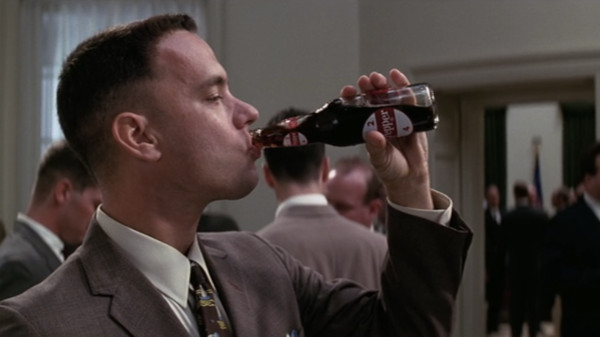We all know that we’re playing a game of Russian Roulette if we keep drinking alcohol as we get older. We become more frail with age. And heart, liver, kidney disease and other issues loom ever larger. But one expert has determined exactly when to stop drinking…
 Perhaps the best way to address your drinking would be to switch to Dr. Pepper
Perhaps the best way to address your drinking would be to switch to Dr. Pepper
– like Forrest Grump, in the 1988 movie of the same name…
No, I don’t mean what time of night to stop. I mean what age we should give up booze altogether, to ensure we enjoy a long, healthy Golden Age.
Who is Dr. Restak?
Richard Restak, MD, is a neurologist who specializes in the diagnosis, treatment and – most importantly – prevention of dementia. He’s written some 20 books, two of which made the New York Times Non-Fiction Best-Seller list.
He is a Clinical Professor of Neurology at George Washington University School of Medicine & Health Sciences.
So he has some justification for calling himself an expert on the brain and it’s inevitable decline.
His pivotal recommendation
The good doctor has a new book out in which he addresses the whole issue of drinking – from a behavioural and neurological viewpoint. In How to Prevent Dementia, the he reveals that consumption of alcohol ― especially large quantities of it, regularly ― can damage your brain. It’s a ‘direct neurotoxin’, he warns.
Naturally, since alcohol is so inherently dangers for people of all ages and conditions, he recommends first and foremost, that nobody drink at all. But we all know that’s really just a position statement to show where he stands morally and ethically on alcohol. I really don’t think Restak is naive enough to believe everyone, everywhere would ever stop drinking booze. But he makes his point.
Evaluate your relationship
“Ask yourself, ‘why do I drink?’” he challenges his readers. “If the answer is ‘because alcohol helps me to elevate my mood and lower my anxiety,’ you may be at some peril, and it’s probably best to stop altogether,” he said in his book.
When to stop
“I strongly suggest that if you are 65 years old or older, that you completely and permanently eliminate alcohol from your diet,” Dr. Restak says. And he cites a number of good reasons.
Not surprisingly, part of the complex of reasons for not drinking has to do with the risk of falling. The more you drink, the tipsier you get – literally – and the more you risk falling.
But that all works in concert with the tendency for us all to become less physically stable as we age. The older we get, the more likely we are to suffer dizzy spells and sudden weakness in our limbs. Add the effects of alcohol and you have a recipe for disaster. Now, factor in the effects of bone loss and the tendency for older folks to break their hips in a fall… And you can see how booze can be a trigger for that last, terminal ambulance ride to the hospital.
In addition – if we needed more convincing – the older we get, the more susceptible we become to alcohol’s effects. Folks who in their early 70s could drink 2 or 3 glasses of wine with dinner and after, and not feel impaired, may feel tipsy after one glass by their early 80s. The problem is, they still think they an handle 2 or 3.
Severe neural signs
Folks who drink too much regularly often complain of blacking out during a binge, or ‘losing a day’. These are chief indications of a type of dementia specifically related to booze abuse.
Korsakoff’s Syndrome is what they officially call this kind of alarming development. Restak says it’s “marked by a severe loss of recent memory,” and, “results from the direct effect of alcohol on the brain.”
This extreme condition results from the reduction of thiamine – vitamin B13 – in your system, caused by heavy drinking. “Within an hour, a normally functioning heavy drinker may become confused, lose balance, stagger, and fall,” Restak warns. “Most affected is the memory for recent events.
My take
I agree with Restak entirely, on an intellectual level. I’ve also had the benefit of advice from a number of geriatricians, since my mother began her decline a few years ago and entered a long term care facility.
Restak is really just echoing what all the experts say.
But I also know a little bit about human nature. And I don’t think the assertions of one neurologist or any number of other doctors will convince many drinkers to go dry. But this is the time to raise the question. It’s ‘Dry January’, after all, and it’s only proper – not to mention smart – to at least think about one’s drinking.
Based on what I learned dealing with my mother’s issues, and the changes in my own cognitive and somatic feelings as I age, I had already cut my alcohol consumption by about two-thirds before I even ran across Dr. Restak.
I won’t presume to tell you what you should do, of course. But I will suggest that, one day, a little voice in the back of your mind will say, “It’s time to cut back!” If you look, all the indications will be there. Just follow your heart and employ common sense.
~ Maggie J.

